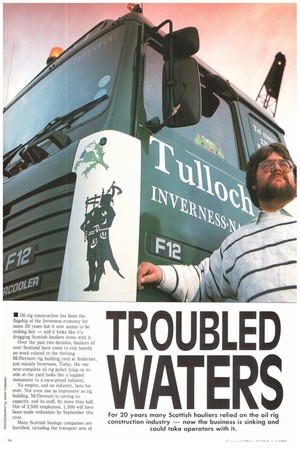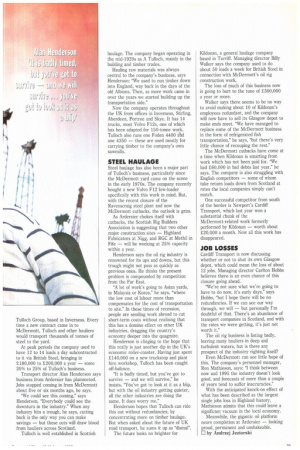TROUBLED
Page 40

Page 41

If you've noticed an error in this article please click here to report it so we can fix it.
TIERS For 20 years many Scottish hauliers relied on the oil rig construction industry — now the business is sinking and could take operators with it.
• Oil rig construction has been the flagship of the Inverness economy for some 20 years but it now seems to be sinking fast — and it looks like it's dragging Scottish hauliers down with it.
Over the past two decades, hauliers all over Scotland have come to rely heavily on work related to the thriving McDermott rig building yard at Ardersier, just outside Inverness. Today, the one near-complete oil rig jacket lying on its side at the yard looks like a toppled / • monument to a once-proud industry. No empire, and no industry, lasts for ever. Not even one as impressive as rig
2 building. McDermott is cutting its capacity, and its staff, by more than half.
›Out of 2,500 employees, 1,300 will have
• been made redundant by September this • year. Many Scottish haulage companies are E horrified, including the transport arm of Tulloch Group, based in Inverness. Every time a new contract came in to McDermott, Tulloch and other hauliers would transport thousands of tonnes of steel to the yard.
At peak periods the company used to have 12 to 14 loads a day subcontracted to it via British Steel, bringing in £180,000 to 2.200,000 a year — some 20% to 25% of Tulloch's business.
Transport director Alan Henderson says business from Ardersier has plummeted. Jobs stopped coming in from McDermott about five or six months ago, he says.
"We could see this coming," says Henderson. "Everybody could see the downturn in the industry." When any industry hits a trough, he says, cutting back is the only way you can make savings — but these cuts will draw blood from hauliers across Scotland.
Tulloch is well established in Scottish haulage. The company began operating in the mid-1920s as A Tulloch, mainly in the building and timber trades.
Hauling raw materials was always central to the company's business, says Henderson: "We used to run timber down into England, way back in the days of the old Albions. Then, as more work came in over the years we started building up the transportation side."
Now the company operates throughout the UK from offices in Inverness, Stirling, Aberdeen, Portree and Skye. It has 14 trucks, most Volvo F12s, one of which has been adapted for 150-tonne work. Tulloch also runs one Foden 4400 Ad one 4350 — these are used mostly for carrying timber to the company's own sawmills.
STEEL HAULAGE
Steel haulage has also been a major part of Tulloch's business, particularly since the McDermott yard came on the scene in the early 1970s. The company recently bought a new Volvo F12 low-loader specifically with this work in mind. But, with the recent closure of the Ravenscraig steel plant and now the McDermott cutbacks, the outlook is grim.
As Ardersier chokes itself with cutbacks, the Scottish Rig Builders Association is suggesting that two other major construction sites — Highland Fabricators at Nigg, and RGC at Methil in Fife — will be working at 25% capacity within a year.
Henderson says the oil rig industry is renowned for its ups and downs, but this trough might not pass as quickly as previous ones. He thinks the present problem is compounded by competition from the Far East.
"A lot of work's going to Asian yards, in Malaysia or Korea," he says, "where the low cost of labour more than compensates for the cost of transportation to site." In these times of recession, people are sending work abroad to cut short-term costs without realising that this has a domino effect on other UK industries, dragging the country's economy deeper into the quagmire.
Henderson is clinging to the hope that this really is just another dip in the UK's economic roller-coaster. Having just spent £140,000 on a new truckstop and plant hire workshop, Tulloch has been caught off-balance.
"It is badly timed, but you've got to survive — and we will survive," he insists. "You've got to look at it as a blip, but with the oil industry getting quieter, all the other industries are doing the same. It does worry me."
Henderson hopes that Tulloch can ride this out without redundancies, by concentrating more on timber haulage. But when asked about the future of UK road transport, he sums it up as "dismal".
The future looks no brighter for Kildonan, a general haulage company based in Turriff. Managing director Billy Walker says the company used to do about 50 loads a week for British Steel in connection with McDermott's oil rig construction work.
The loss of much of this business now is going to hurt to the tune of £500,000 a year or more.
Walker says there seems to be no way to avoid making about 10 of Kildonan's employees redundant, and the company will now have to sell its Glasgow depot to make ends meet. "We have managed to replace some of the McDermott business in the form of refrigerated fish transportation," he says, "but there's very little chance of recouping the rest."
The McDermott cutbacks have come at a time when Kildonan is smarting from work which has not been paid for. "We had £60,000 in bad debts last year," he says. The company is also struggling with English competitors — some of whom take return loads down from Scotland at rates the local companies simply can't match.
One successful competitor from south of the border is Newport's Cardiff Transport, which last year won a substantial chunk of the McDermott-related work formerly performed by Kildonan — worth about £20,000 a month. Now all this work has disappeared.
JOB LOSSES
Cardiff Transport is now discussing whether or not to shut its own Glasgow depot, which could mean the loss of about 12 jobs. Managing director Carlton Hobbs believes there is an even chance of this closure going ahead.
"We're not sure what we're going to have to do now, it's early days," says Hobbs, "but I hope there will be no redundancies. If we can see our way through, we will — but personally I'm doubtful of that. There's an abundance of transport companies in Scotland, and with the rates we were getting, it's just not worth it."
The oil rig business is listing badly, leaving many hauliers in deep and turbulent waters, but is there any prospect of the industry righting itself?
Even McDermott can see little hope of this. The company's personnel manager, Ron Mathieson, says: "I think between now and 1995 the industry doesn't look good, and forecasts of more than a couple of years tend to suffer inaccuracies."
With the anticipated knock-on effect of what has been described as the largest single jobs loss in Highland history, Mathieson admits that this could leave a significant vacuum in the local economy.
Meanwhile, the gigantic oil platform nears completion at Ardersier — looking proud, permanent and unshakeable. ID by Andrzej Jeziorski












































































